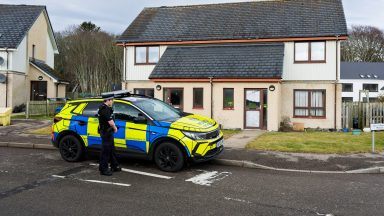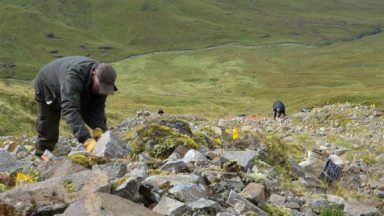The brother of Manchester Arena bomber Salman Abedi is “equally guilty” over the blast which killed 22 people and injured hundreds of others, the Old Bailey has heard.
Hashem Abedi, 22, allegedly helped create the explosives intended “to kill and to inflict maximum damage” on the crowd as they left an Ariana Grande concert.
Scots schoolgirl Eilidh MacLeod, 14, from Barra, died in the explosion on May 22, 2017, while her friend, Laura MacIntyre, was seriously injured.
The younger brother, on trial for murder, is accused of helping Salman Abedi stockpile chemicals at a bomb-making base in north Manchester.
He was allegedly linked to the bombing by a scrap of metal from a Consumer’s Pride vegetable oil can found at the scene of the carnage.
He had also bought screws and nails for shrapnel and used fake online accounts to buy two of the three chemicals used to make TATP explosives, jurors were told.

Opening the trial at the Old Bailey on Tuesday, Duncan Penny QC said: “The prosecution’s case is that this defendant is just as guilty of the murder of the 22 people killed as was his brother.
“He is equally guilty of the attempted murder of many others and in doing so he was guilty of agreeing with his brother to cause an explosion or explosions of a nature likely to endanger life.”
The prosecutor said Abedi claimed to have “no inkling” of his brother’s murderous intent.
However, jurors were told he was present when Salman discussed “jihad” with a schoolboy, telling him: “Do chemistry so you can build a bomb.”
The court heard that Salman Abedi, carrying the bomb in a rucksack, joined the throng of parents and families picking up young concert-goers in the foyer of the 21,000-capacity venue, before detonating it at 10.31pm.
Such was the ferocity of the explosion that the bomber was dismembered, with his head and upper torso being found in Victoria Station ticket hall, well away from other body parts strewn around the foyer.
Mr Penny said: “The scene that met the survivors and those that attended thereafter was one of destruction and chaos.
“Twenty-two people – men, women, teenagers and a child – were killed, 28 people were very seriously injured, a further 63 people were seriously injured, 111 others were also hospitalised,” he said, adding that hundreds more were traumatised.
“The bomb which was detonated was self-evidently designed to kill and maim as many people as possible.
“It was packed with lethal shrapnel and it was detonated in the middle of a crowd in a very public area – the intention being to kill and to inflict maximum damage.”
Mr Penny said the explosion was the result of months of planning, experimentation and preparation by the brothers.
Hashem Abedi had allegedly assisted and encouraged his brother by stockpiling chemicals and sourcing oil cans from his work at a takeaway in Greater Manchester, saying he wanted them for scrap.
His fingerprints were found on metal from the cans at the family home in Fallowfield, Manchester, and at his brother’s rented flat in the city centre, the court heard.
A piece of metal retrieved from the bomb site was a “perfect mechanical fit” for other scraps at the two addresses, which were the same type as the cans at Abedi’s work, it was alleged.
Mr Penny said the cans played a “pivotal role” in the design of the bomb container, even though it was probably constructed out of a soft drinks can and cylindrical money tin.
The court heard that the brothers had rented a 12th-floor flat in Blackley in February to prepare and store explosives.
The prosecutor said: “It was located in an anonymous part of north Manchester, miles away from their home, friends and relatives, allowing them to come and go in equal anonymity, whilst stockpiling the ingredients of the bomb.”
After the bombing, Hashem Abedi’s DNA and fingerprints were found at the address as well as traces of TATP.
The brothers also used the Amazon accounts of others to order the chemicals to make explosives, jurors heard.
In mid-April 2017, the brothers bought a Nissan Micra to store bomb-making equipment, the court heard.
The pair, whose parents are Libyan, had allegedly begun to show “some signs of radicalisation” in the years before the bombing, Salman more than Hashem, Mr Penny said.
Hashem Abedi, originally from Manchester, denies 22 counts of murder, attempted murder and conspiring with his brother to cause explosions.
Those killed were Elaine McIver, 43, Saffie Roussos, eight, Sorrell Leczkowski, 14, Eilidh MacLeod, 14, Nell Jones, 14, Olivia Campbell-Hardy, 15, Megan Hurley, 15, Georgina Callander, 18, Chloe Rutherford, 17, Liam Curry, 19, Courtney Boyle, 19, Philip Tron, 32, John Atkinson, 26, Martyn Hett, 29, Kelly Brewster, 32, Angelika Klis, 39, Marcin Klis, 42, Michelle Kiss, 45, Alison Howe, 45, Lisa Lees, 43, Wendy Fawell, 50 and Jane Tweddle, 51.
Members of the victims’ families attended the trial, which is due to go on for eight weeks.
The case continues on Wednesday.
Follow STV News on WhatsApp
Scan the QR code on your mobile device for all the latest news from around the country



























